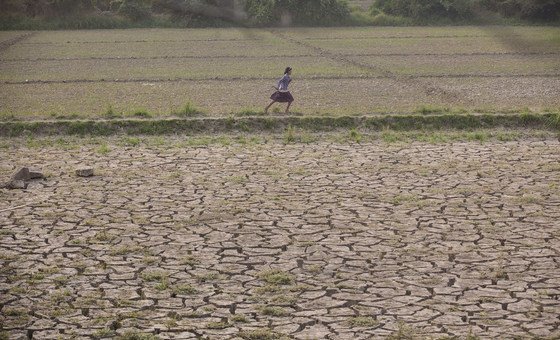A girl runs through a dried field in Mynmar’s Sagaing region. Once a fertile farmland, the soil has degraded and may not sustain crops for many years to come.
Soil is a “treasure beneath our feet,” essential to human lives and well-being, a senior United Nations official has highlighted, warning, however, that this invaluable resource is under constant threat from the little-understood phenomenon of soil pollution.
According to José Graziano da Silva, the Director General of the UN Food and Agriculture Organization, human activities are the primary source of this “invisible” pollution.
Thousands of chemicals used in every-day lives – and tonnes of urban, industrial and agricultural waste – end up in soil, leaving it “bare and degraded,” he said, in a message marking the World Soil Day.
In addition, with soil essential to providing food for 95 per cent of the world, soil pollution not only reduces the quantity and quality of crops and produce, it also worsens poverty and compromises the future for generations to come, warned the head of FAO.
‘Be a part of the solution’
But, with everyone taking action to prevent soil degradation, the challenges can be overcome, said Mr. Graziano da Silva, urging everyone to “be a part of the solution.”
The theme for this year’s commemoration is just that: “be the solution to soil pollution” and FAO is offering key recommendations through which people can make a difference.
For instance, studies show that up to 80 per cent of urban waste – ending up in landfills and entering the soil – can be recycled. This is particularly important for electronic, “e-waste”.
UN News Fact Box: Soil…
• Holds three times as much carbon as the atmosphere and can help overcome some climate change challenges;
• Can improve food security for 815 million people and provide better nutrition for two billion people
• Provides 95 per cent of all food but 33 per cent of the soil globally has are already degraded
Source: FAO
Old computers and devices can be donated to charities or institutions where they will continued to be used, their components can also be recycled, says the UN agency.
Recycling and sustainable choices can also help curb plastic pollution.
Each and every person can contribute to solving the problem
“Each and every person can also contribute to solving the problem by simply carrying a reusable bottle and grocery bag, and buying products with reduced or recycled packaging,” urges FAO.
Responsible and sustainable use and management of agrochemicals, solid contamination and degradation, can be prevented, it adds.

A farmer transplants rice in a paddy field in the Philippines. Globally almost 95 per cent of the food comes from soil.
Glinka World Soil Prize
As part of global commemorations, the Global Soil Partnership awarded the Glinka World Soil Prize to Professor Rattan Lal, the President of the International Union of Social Science recognizing his “outstanding contribution to sustainable soil management.”
Professor Lal’s scientific work contributed to soil organic carbon restoration and improvement of soil structure, as well as converting science and research into policy and decision-making, according to FAO.
The Glinka World Soil Prize is named after the pioneering Russian scientist Konstantin D. Glinka. It honours individuals and organizations for leadership in promoting sustainable soil management and the protection of soil resources.
In addition, this year’s commemoration saw the inaugural presentation of the World Soil Day Award, which was presented to Practical Action Bangladesh for its work in raising awards on the topic and organizing the best World Soil Day celebrations last year.
Farmers harvest rice near Ta Pra Mok, Thailand. Globally almost 95 per cent of the food comes from soil.

